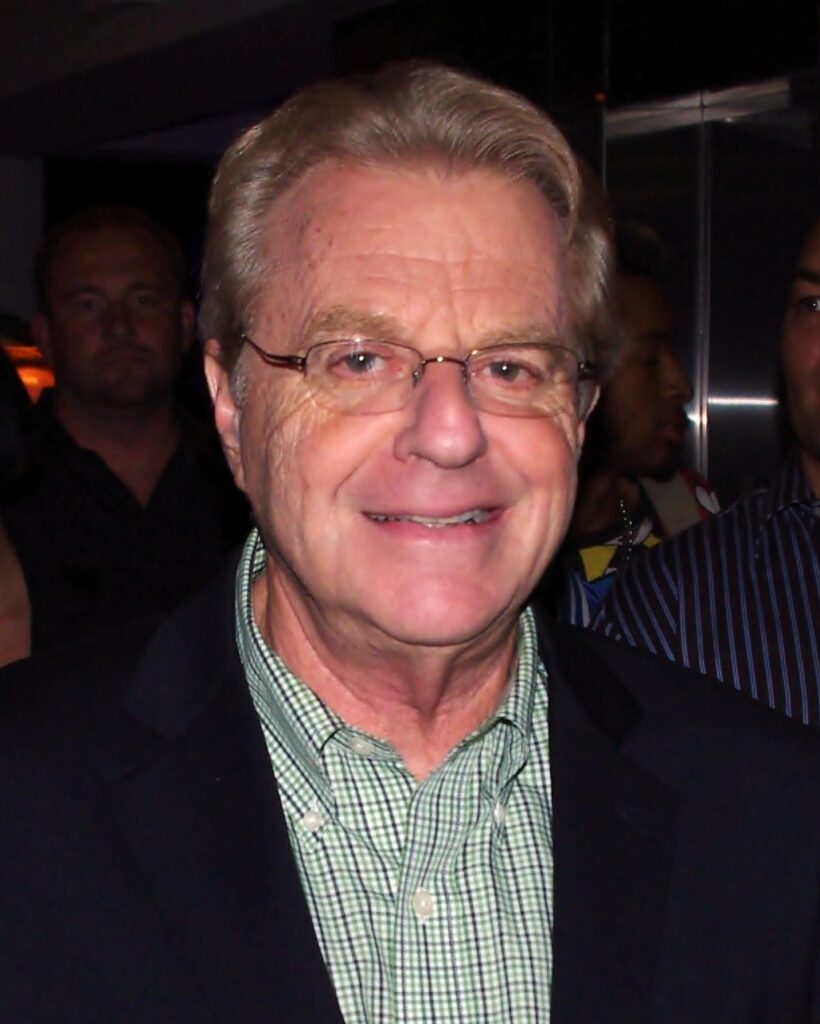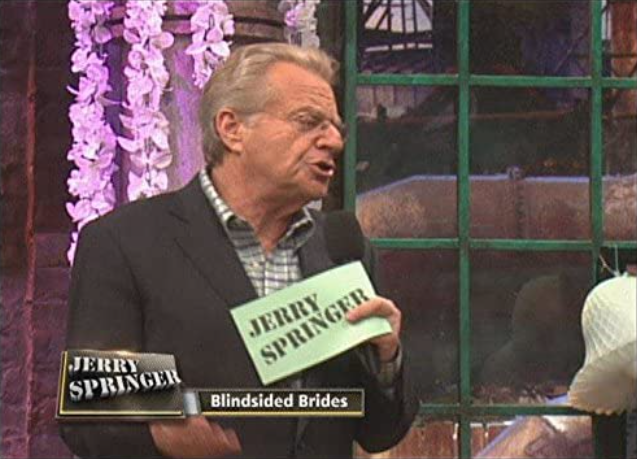
Throughout history, there have been extraordinary people who live lives so rich and varied that they seem to belong to a category of their own. Gerald Norman Springer — known to all of us as Jerry Springer — is one such individual, a man whose incredible journey took him from the simple beginnings of a World War II bomb shelter to the bright lights of television stardom.
And now, we delve deeper into the remarkable life of Jerry Springer, exploring the many facets of his personal and professional experiences that have shaped the man we know today.
From War-Torn Beginnings to the American Dream
In the midst of World War II, when Europe was ravaged by conflict and destruction, a glimmer of hope emerged in the form of a child born in a makeshift bomb shelter. Gerald Norman Springer, destined to become a cultural icon, entered the world in the London Underground station of Highgate while it was being used as a bomb shelter, surrounded by people seeking refuge from the chaos above.
Jerry’s early life was marked by challenges.
His parents, Margot and Richard Springer, were German-Jewish refugees who had narrowly escaped the horrors of the Holocaust. The family’s search for safety led them to leave Europe behind and immigrate to the United States in 1949.

They settled in the Kew Gardens neighborhood of Queens, New York City, where young Jerry would begin to craft the foundations of his storied future.
Jerry’s thirst for knowledge and his innate curiosity led him to pursue higher education, ultimately earning a Bachelor of Arts in political science from Tulane University in 1965, followed by a Juris Doctor from Northwestern University in 1968. Little did he know that his dedication to learning would become a cornerstone in a life filled with unexpected twists and turns.
It was during his time at Northwestern that Jerry found his passion for politics, spurred on by the charisma and leadership of figures like Senator John F. Kennedy. This passion would lead him to work as a political campaign adviser for Robert F. Kennedy in 1968, marking the beginning of his journey into the world of politics and setting the stage for the extraordinary adventures that awaited him.
A Foray into Politics and Broadcasting
Jerry Springer’s passion for politics led him to work as a political campaign adviser for Robert F. Kennedy in 1968. Eventually, his aspirations took him to Cincinnati, where he decided to run for Congress in 1970.
Although he didn’t manage to unseat the incumbent Republican, Jerry made a significant impact, capturing an impressive 45% of the vote in a district that traditionally leaned Republican.
His commitment to civic engagement didn’t end there, as his continued efforts led him to secure a seat on the Cincinnati City Council in 1971.
His tenure on the council wasn’t without controversy, as the married man resigned in 1974 after reaching out to the FBI to confess his solicitation of a prostitute, driven by the weight of his conscience. However, Jerry’s determination and resilience saw him make a comeback the following year, winning re-election by a landslide.
By 1977, he was chosen by his fellow council members to serve a one-year term as the Mayor of Cincinnati.
Though his political career would eventually wind down, Jerry’s natural charisma and ability to connect with people led him to find a new path in the world of broadcasting. Starting as a political reporter and commentator in Cincinnati, his unique voice and perspective quickly gained him a following. As his popularity grew, so did his roles in the newsroom, eventually becoming the primary news anchor and managing editor.
Jerry’s time in the newsroom was marked by the creation of his now-famous catchphrase:
“Take care of yourself, and each other.”
This simple yet powerful message would accompany him throughout his career, becoming a signature element of his future endeavors.
The Birth of a Television Phenomenon
Jerry Springer’s undeniable magnetism and flair for storytelling inevitably led him to the world of television talk shows.

Under the guidance of new producer Richard Dominick, the Jerry Springer Show embraced a more sensationalist approach, focusing on the dramatic and often controversial lives of everyday people.
Guests were brought on stage to confront issues such as adultery, family dysfunction, and other scandalous situations, which often resulted in emotional outbursts and even physical altercations. This new direction propelled the show to massive success, with its ratings soaring and its influence felt across the television landscape.
Jerry’s unique brand of entertainment became synonymous with the rise of ‘trash TV’ in the 1990s, and his show was both a commercial smash and a certifiable cultural phenomenon. As the show’s host, Jerry deftly navigated the chaos and drama, always closing each episode with his signature “Final Thought,” a moment of reflection and wisdom that endeared him to viewers across the nation.
New Ventures and a Return to His Roots
After the curtain fell on the Jerry Springer Show in 2018, Jerry continued to evolve, exploring new platforms and opportunities.
In 2007, he stepped into the role of host for the popular talent show America’s Got Talent, bringing his unique charm and wit to a new audience. He also ventured into the world of podcasting in 2015 with the launch of the Jerry Springer Podcast, which ran until 2022.
One of the most intriguing chapters in Jerry’s career came in 2019 with the debut of his courtroom show, Judge Jerry.
This new program allowed Jerry to combine his talents as a captivating host with his legal background, offering a more “grown-up” take on the world of televised disputes. For three seasons, Jerry donned the robes of a judge, presiding over cases and offering his distinct brand of justice to viewers.
What Happened to Jerry Springer?
On April 27, 2023, the world bid farewell to a truly remarkable figure as Jerry Springer passed away at his home in Evanston, Illinois. He was 79 years old. A family spokesperson revealed that Jerry had been diagnosed with pancreatic cancer just a few months before his death, marking a somber end to a life that had been so full of vibrancy and adventure.
From his humble beginnings in a London bomb shelter to the heights of television stardom, Jerry Springer’s life was a testament to the power of resilience, determination, and an unwavering commitment to making a difference.
As a lawyer, politician, broadcaster, and entertainer, he touched countless lives and left an indelible mark on the world.
As we remember and celebrate the life of Jerry Springer, let us not forget the lessons his incredible journey can teach us all: to embrace every opportunity, to persevere through adversity, and to always stay curious about the world around us. And in the words of the man himself, “Take care of yourself, and each other.”

Jerry Spring Quotes to Remember Him By
Jerry Springer, a man of many roles and experiences, has shared numerous insightful and witty quotes throughout his career. Here is a collection of some of his most memorable words of wisdom to help us remember the amazing TV host and politician:
- “All of us, whether or not we’re celebrities, every one ought to spend part of their life making someone else’s life better.”
- “You know, the truth is there’s never been a relationship where both parties at one time or another couldn’t use a little forgiveness from the other. I mean, we are each by definition imperfect, so being less than we ought to be doing something we shouldn’t have done is overtime, inevitable.”
- “Take care of yourselves, and each other.”
- “Love is great for us, but we don’t always love who is great for us.”
- “If you can’t be committed to another person, at least be committed to the concept of character and don’t cheat.”
- “You fight to defend a lover, not to win one. If you do, it isn’t love.”
- “There’s something about the openness of the American people. Yes, we have our faults, but deep down, there’s a goodness. America doesn’t want to take over the world; in many ways, we don’t want to be bothered by the rest of the world.”
- “I’m a happy guy, but if I’m in a rare dark mood, I won’t go out because I don’t want to be horrible to people.”
- “We are all born as empty vessels which can be shaped by moral values.”
- “I treat politics kind of like my religion. It’s something I believe in, but I don’t want to have to make a living at it, because if you make a living at it, you somehow become dishonest.”
- “I don’t want to be a celebrity.”
- “No one would have picked me out in high school and said, ‘This guy is going to be in show business.’ I don’t have any of the talents you would normally associate with show business.”
- “I don’t live in Hollywood. I don’t have celebrities as friends. I like them, but I don’t pal around with them. I just live in the Midwest, a real normal world.”
- “We can’t just have mainstream behavior on television in a free society, we have to make sure we see the whole panorama of human behavior.”
- “I knew early on that I would do politics, but I would never make a living at it. I would do something else.”
- “To go from politics to news, at least the subject matter is the same, even if the view is different.”
- “I play a crazy talk-show host, but that’s not me. It’s like an actor playing a role.”
- “I’m in shape, but only if you consider a circle a shape.”
- “With a face like mine, I do better in print.”
- “Somebody once said I had a face for radio and a voice for newspapers.”
- “My guess is more reporters probably vote Democrat than Republican — just because I think reporters are smart.”
- “I watch sports and cable news. I’m a political junkie, so that’s my interest.”
- “I’m liberal, but I watch the three majors. Obviously I watch MSNBC, also CNN and Fox, which is what I would call ridiculously to the right.”
- “It’s just a show. It’s not the end of Western Civilization. It’s chewing gum.”
- “How lucky we are to be able to see and hear so much of our history over the past century as it was happening.”
- “TV is a huge draw. It’s a magnet.”
- “I create this persona for the show. And that’s what it is. I’m an act.”
- “The bias against the show is purely elitist. We’re all like the people on the show — the difference is that some of us speak better, or were born richer. There’s nothing that happens on my show that rich people don’t experience.”


